strategies to utilize Tourist behaviour assignment research methods to establish viable tourism project proposals
Question
Task: How can Tourist behaviour assignment research techniques be used to establish viable tourism project ventures
Answer
Introduction
Report context
This Tourist behaviour assignment explores strategies to measure tourism project proposals violability through research. Tourist behaviour is the consumption of both every day and unusual products and services outside of the environment of everyday life by tourist in the travel and hospitality sector. In this Tourist behaviour assignment, family tourism has been selected as special focus in this assignment. It determines the attitude and contention of tourists towards adoption of particular services. Auckland City Hotel is centrally located and well known for its extraordinary luxurious services (Achhobson.co.nz, 2022). The hotel is renowned for the customer centric services that increase its competitiveness. Behaviour of tourists towards the hotel is usually positive and they are satisfied with the accommodation services provided by the hotel.
Purpose of report
Present Tourist behaviour assignment aims at identification of tourist behaviour towards the accommodation services of Auckland City Hotel New Zealand. Evaluation of the comment and review of tourism towards the accommodation and hotel service activities has been identified in this report. Another important purpose of this report is to seek the needs and preferences of tourists based on their age, nationality and gender. Evaluation of the marketing implications of specific activities of the tourist in this regard has also been identified. Further recommendation has also been provided to improve the operation activities of the hotel selected.
Comments from Trip advisor
Specific activities regarding the tourists in the Auckland City Hotel New Zealand have been identified from the review on Trip advisor. All those comments help to identify needs and preferences of customers towards the hotel accommodation based on their age, gender and nationality. All those comments are evaluated from the Trip Advisor are as follows:
It has been identified on this Tourist behaviour assignment that Auckland City Hotel is centrally located and affordable by tourists coming from other nations due to its service excellence. A tourist from Sydney has stated that the hotel is very cost effective that helps them to stay within the hotel (Tripadvisor.com, 2022). It has also been stated that water is clean and water pressure in showers is good. Behaviour of tourists is very good along with the attitude towards the hotel Auckland City. Another tourist from London has stated that the atmosphere of the hotel is very clean and tidy.
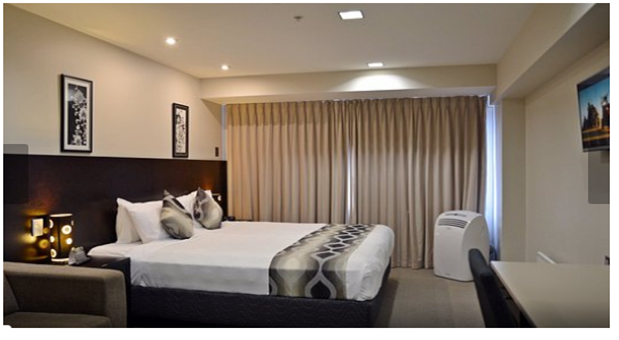
Figure 1: Ambience of rooms
(Source: Tripadvisor.com, 2022)
Another group of youth tourists have shared her opinion during the Tourist behaviour assignment research that when she was in an urgent need to book a hotel, she just called customer care represent to arrange a room for her. She said that people are very cooperative and understanding so “God bless” their hotel. Tourists from America have stated that staffs are very cooperative and supportive and that they helped them to stay long within the hotel.
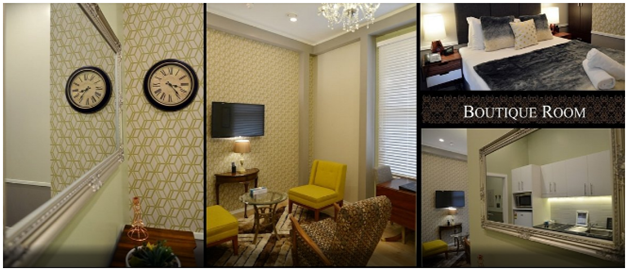
Figure 2: Ambience of boutique rooms
(Source: Tripadvisor.com, 2022)
One local tourist said that rooms are good but there is a need for the improvement of services. It has been stated by that older aged tourist that there is a need of much staffs regarding cleaning of rooms staff and check furniture as there is rubbish like a small bag of drugs (Tripadvisor.com, 2022) There are spa facilities but there are no plug connections so tourists are unable to enjoy their spa at hotel. There was no Christian propaganda in the room which was quite awful to see as it was a big five stars hotel. An American tourist has stated the fact that lighting throughout is somewhat dim for her especially in post MIQ for medical check-up (Tripadvisor.com, 2022). There is a need to improve the lighting system so that tourists feel better, especially those who came to refresh their mind after health issues. It is important that one tourist claims that he will not stay again in the help because the place is dirty, the service average, the rooms simple. There is also limited parking and rooms are dirty that do not satisfy the soul of the tourists at all. One family tourist has stated that they visited the hotel for a family funeral. The hotel is close to the CBD, quiet, clean and friendly and the overall spelling of the hotel was very comfortable (Tripadvisor.com, 2022). But another tourist from local areas has stated that the parking charge is $30 per night, which is too much and it does not satisfy their needs and wants. Another tourist said that it has a great location as it is just a few minutes to the intercity bus depot and sky city tower.
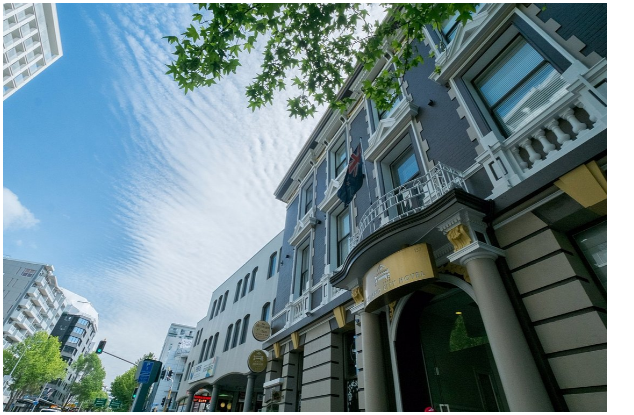
Figure 3: Great location of Auckland City Hotel
(Source: Tripadvisor.com, 2022)
A newly married young aged couple from another country has said that the ambience of the room and its location are very attractive. From the behaviour of staff to the behaviour of higher management they are so friendly and it would help them visit the hotel again. All the staff knew multiple languages that helped them to communicate with tourists from different cultures. Even the game zone for kids and children are very attractive that satisfies the needs and wants of tourists.
Tourist behaviour assignment Literature review
Past researchers
There is vast amount of literature has been published those talks about the tourist attractions and activities in New Zealand. Family tourism has been chosen in this context to seek literatures about the topic selected. According to Fountain et al. (2015), family experiences of leisure include opportunities for both ‘family time’ and ‘own time’. It has been identified from the paper that the motivation factor for visiting the place by mother is different from that of father who intended to visit the place with their child or children. Attraction depends on whether the parent is visiting the attractions by a co-parent or as sole parents or accompanied. In addition to this, Schänzel& Yeoman (2014), argued that small family incorporate tourism than big families in the future. In future family tourism would be increased that would in turn help to increase the economy of the country New Zealand. It has been identified that younger aged to middle aged tourists prefer visiting places more than the older aged. Even now the children are showing much interest towards family tourism indicating improvement of social networks. On the contrary, Therkelsen&Lottrup (2015), contradict the fact that zoo visits have significantly increased in the family tourism aspect. Children usually like to see animals, which increases incidents of family tourism at the Zoo areas. When compared to girls, boys are more interested towards the tourism attraction at zoos rather than girl tourists at their child ages. In contrast to this, Turley (2001), argued that children are attracted towards the recreational activities at zoos. In future tourism to zoos would definitely increase in the tourism sector in New Zealand when comp-red to other attractions. On this Tourist behaviourassignment it is observed that Family tourism in the western countries is sore when compared to other countries in the globe [Refer to Appendix]. In addition to this, Insch (2020), contradicted that over tourism harms the environment and affects the wellbeing of nature. In this regard, there is a strong need for a sustainable policy implementation in NZ. NZ is less likely to be affected by the pandemic due to early closure of international flights and water transport routes. In this regard, when the incident of pandemic slowed down, indigenous tourism in NZ started to increase (Carr, 2020). It has also been identified that domestic tourism has significantly increased in New Zealand especially after the pandemic. Needs and wants of people to refresh their minds has also increased, which in turn increases domestic tourism. As mentioned by Hussain &Fusté-Forné (2021), post pandemic recovery has also improved the economic condition of New Zealand as the intention of domestic tourism has increased significantly.
Tourist behaviour assignment Theories identified
Theory of Reasoned Action
Martin Fishbein and IcekAjzen have developed the theory of reasoned action to determine the fact that there is a strong relation between the marketing and the preexisting attitudes of consumers. As opined by Ulker-Demirel&Ciftci (2020), according to TRA, consumers think that their behaviour would give the specific outcome towards achievement of success in adopting goods or services. Even consumers take a decision only when theory thinks it would help them provide a proper outcome. Tourists in the tourism sector in NZ also think about the services that could give them value could only be adopted. In this regard, they carried out a decision to adopt services at affordable cost which would help to save money as well as help them to fulfil their desire.
Engel Kollat Blackwell Model
As per the Engel Kollat Blackwell Model, consumers make decisions based on the four important stages. The five most important stages towards adoption of the goods and services by customers are as follows:
- Identification of need
- Tourist behaviour assignment Information searching
- Alternatives evaluation
- Purchasing decision
- Post-purchase outcomes.
Tourist in NZ also focuses on these five stages before finding out the suitable accommodation services from the hotels. As opined by Zhang et al. (2020), Input is the first phase where consumers seek relayed information about the goods and services they want to adopt. In the second stage, rational insights are carried out to determine whether they need to adopt some services or not. In this stage, based on the collected information, decisions are taken for further adoption of goods or services. After that alternative are identified and ultimate decisions are implemented. At first tourists identify the related information about the hotel or services from the social media site and then seek alternative options. After identification of alternative options, purchase decisions are made and post purchase outcomes are observed.
Methods
Secondary research methods have been applied in this context to determine the way by which the needs and preferences of tourists are shaped by gender, age, group orientation and nationality on this paper. Both qualitative and quantitative data from different journal articles and websites has been collected to determine the social media comments. TripAdvisor has been selected to collect the comet regarding the needs and wants of tourists in the Auckland City Hotel. Needs and preferences of tourists based on the point of age, gender and nationality has been identified. Collection of secondary qualitative and quantitative data has helped to determine all those factors affecting the needs and preferences shaped the tourism sector in New Zealand.
Findings
It has been identified that differences in the gender affects the needs and wants of tourist regarding specific activities. According to research done on this Tourist behaviour assignment, men were more assertive and less anxious than women, indicating that the needs of women are higher than men. It has been also identified that female tourists are women higher than men on trust. Even the level of anxiety, gregariousness, and tender mindedness are high in females when compared to male. Travel motivations are usually explained by push and pull motivations theory. Where needs and demand of accommodation are high amongfemale visitors of Auckland City Hotel. In addition to this, Cockburn-Wootten& McIntosh (2020), age is a very crucial factor that determines the type of needs and preferences tourists want from their hotel. It has been also identified that activity participation in tourism increases when an individual is young. On the other hand, the activity of tourists decreases as the individual grows old. In this regard it can be said that the requirements and needs of customers who are younger are usually high when compared to the tourists who are older. It has been identified that people at 25-54 years old are the ones who focus on adventure, relaxation and luxury (Tourismnewzealand.com, 2022). At the same time, it can be said that the sense of relaxation and nature exploration are high in the older aged one while the sense of relaxation is usually low among the younger aged tourists in the Auckland City Hotel New Zealand. In the modern decade, it has been found that younger tourists prefer seeking novelty compared to older travellers from the hotels. Hence, needs and preferences towards luxurious accommodation are higher among the younger tourists of Auckland City Hotel New Zealand than older aged one. According to Stats (2018), nationality is another important factor that determines the motivation of tourists behind the attraction or activities. It has been identified that 39.6 percent of New Zealand visitor arrivals are Australian. It has been identified that a total 533,681 visitors in 2019 came to New Zealand from Australia. National culture obviously affects the behaviour of tourists and their activities in the accommodation areas. It has been identified that differences in nationality increase the attraction of tourists towards the places more than the same nationals. Nationality is a discriminating variable for explaining the differences found in the behaviour of tourists at all. Needs and demand of western countries' tourists are high while the tourists from Asian countries are usually low. In the case of Auckland City Hotel, staff and hoteliers know different kinds of languages so that there might not be any kind of cross-cultural issue regarding the differences in nationality.
Discussion
From the overall Tourist behaviour assignment it has been identified that age, gender, nationality and cultural orientation are the most important factors that determine the tourist attraction and their activities in New Zealand. As opined by Figueroa-Domecq et al. (2020), young people increase the incidence of tourist activities compared to older aged people. It has been also identified that culture orientation is a big factor that determines the needs and preferences of tourists towards their destination. It has been identified that age is the great influencer of tourist’s attraction in NZ. It has been identified that nationality also determines the tourist altercation. Eventually people from different cultures are usually attracted towards other cultures (Weforum.org, 2022). It has been identified that the expenditure for international tourist has significantly increased compared to national or domestic tourism in New Zealand.
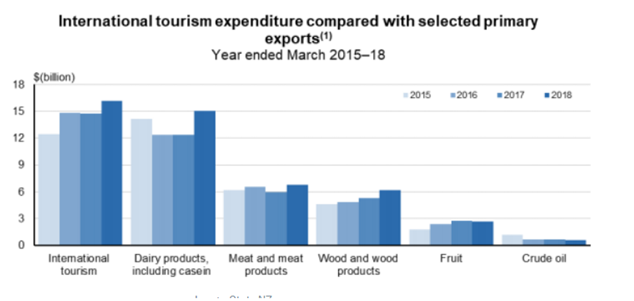
Figure 1: Tourism, a very big deal in New Zealand
(Source: Weforum.org, 2022)
It has been investigated that New Zealand promotes more international tourism and 95% of New Zealanders agree international tourism is a good thing. When compared with the older aged one, younger aged people show more interest towards the tourism activities. In a study of Johann & Ghose (2019), it has been identified that men have more vacation trips and nights away from home than their females. Amount of business trips are also very high among the females when compared to men in New Zealand. In terms of needs and preferences, demand for luxurious accommodation services is high among women when compared to men. It has been identifiedonb this Tourist behaviour assignment that nationality affects the behaviour of tourists in NZ. It has been also identified that a total two million (2002) to three million (2015) was achieved in 13 years in NZ regarding tourist arrival (Parliament.nz, 2022).
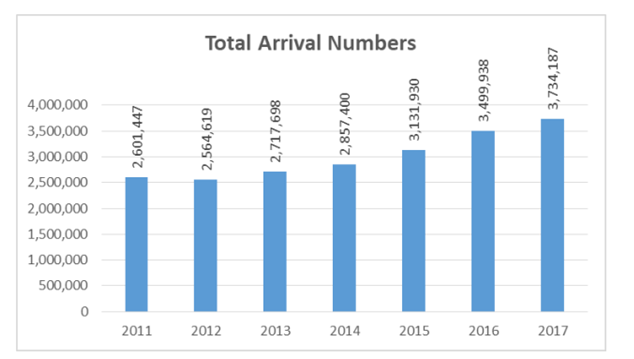
Figure 2: Arrival of tourist beyond national boundary in New Zealand
(Source: Parliament.nz, 2022)
From 2011 to 2017, there were also some significant changes in the international visitor arrivals in New Zealand. Culture is another important aspect that determines the intention of tourists towards the achievement of success in meeting their needs and preferences. It has been identified that differences in culture orientation often hinders communication and affects the satisfaction value of tourists. In the case of Auckland City Hotel New Zealand, staff know multiple languages to serve tourists from different nationals as that helps to identify and manage diversified needs of customers. Ability is another important aspect that determines the interest of travellers towards the adoption of some accommodation services from the hotel business.
Conclusions
From the overall discussion it can be concluded that age, gender, group orientation and nationality determine the shapes, the needs and preferences of tourists in Auckland City Hotel New Zealand. It has been identified that needs and preferences towards luxurious accommodation are high among women when compared with men. On the other hand, younger aged people show more interest towards tourism activities. Numbers of vacations and night trips are high among the younger aged one when compared to the older aged one. The level of anxiety, gregariousness, and tender mindedness are very high among the women that drive them for more relaxing trip and accommodation services compared to men who are less anxious and gregarious. Nationality is another important factor that determines preferences of tourists in the particular areas. Especially after the session of pandemic, expenditure for international tourists has significantly increased. In the case of New Zealand, domestic tourism is given special preferences and it also helps to improve the operation process of the hospitality sector of New Zealand. Maximum tourists visit New Zealand are from Australia while rest are from American and Asian countries. Preferences towards the accommodation and luxury are high among the American tourists when compared with the Australian tourists in Auckland City Hotel. Even the differences in culture, also make differences in the needs and preferences of tourists. Tourists from Asian countries need less luxury compared to tourists from American and other western countries.
Recommendations and implications
Based on the overall discussion it can be said that the pandemic has significantly decreased the intention of international tourists towards New Zealand. Strong legislation and early lock down have helped the nation to manage the spread of pandemic efficiently. It has been identified that the post pandemic has increased the incidence of domestic tourism in a huge amount in New Zealand. It has been also identified the fact that post pandemic can improve the tourism condition of the New Zealand in better because of improvement of incident of domestic tourism. Marketing process of the Auckland City Hotel would be significantly increased due to the increase in the number of tourists in New Zealand. Hotel management would also increase their capability and potential towards a more sustainable business process especially after the pandemic crisis. Based on the issues identified on this Tourist behaviourassignment with relation to the Auckland City Hotel, certain recommendation is provided, these are as follows:
There is a need to improve the parking capability in the hotel zone so that tourists do not claim further improvement of space.
The hotel needs to decrease the price of luxurious accommodation services so that tourists special after the pandemic can afford their services.
There is also a need to improve the space in the cafeteria so that large numbers of people can seat together at the same time
There is a need for proper training for staff so that they can be able to manage the needs and wants of customers by making the room clean and serving their needs with better hygiene.
In the post pandemic, tourism sector in New Zealand also needs to focus on including more diversity and equality in workplaces to value people from different age, gender, race, ethnicity and culture as per research findings made on this Tourist behaviour assignment
Reference list
Achhobson.co.nz, 2022. About us. Retrieved from: https://www.achhobson.co.nz/ [Retrieved on 25th May 2022]
Carr, A. (2020). COVID-19, indigenous peoples and tourism: a view from New Zealand. Tourism Geographies, 22(3), 491-502. Retrieved from: https://www.tandfonline.com/doi/abs/10.1080/14616688.2020.1768433
Cockburn-Wootten, C., & McIntosh, A. (2020). Improving the accessibility of the tourism industry in New Zealand. Sustainability, Tourist behaviour assignment 12(24), 10478. Retrieved from:
https://www.mdpi.com/2071-1050/12/24/10478/pdf
Figueroa-Domecq, C., de Jong, A., & Williams, A. M. (2020). Gender, tourism & entrepreneurship: A critical review. Annals of tourism research, 84, 102980. Retrieved from: https://drive.google.com/file/d/1fHz_3C2Sftdle8nIBAyjcMCM2X8uSCWw/view
Fountain, J., Schänzel, H., Stewart, E., &Körner, N. (2015). Family experiences of visitor attractions in New Zealand: Differing opportunities for ‘family time’ and ‘own time’. Annals of Leisure Research, 18(3), 342-358. Retrieved from: https://www.tandfonline.com/doi/abs/10.1080/11745398.2015.1047389
Hussain, A., &Fusté-Forné, F. (2021). Post-pandemic recovery: A case of domestic tourism in Akaroa (South Island, New Zealand). World, 2(1), 127-138. Retrieved from: https://www.mdpi.com/2673-4060/2/1/9/pdf
Insch, A. (2020). The challenges of over-tourism facing New Zealand: Risks and responses. Journal of Destination Marketing & Management, 15, 100378. Retrieved from: https://www.sciencedirect.com/science/article/pii/S2212571X19301453
Johann, M., & Ghose, S. (2019). Gender Differences in Tourism Marketing Product Perceptions. Journal of Emerging Trends in Marketing and Management, Tourist behaviour assignment 1(1), 241-249. Retrieved from: http://www.etimm.ase.ro/RePEc/aes/jetimm/2019/ETIMM_V01_2019_91.pdf
Johns, N., &Gyimothy, S. (2002). Mythologies of a theme park: An icon of modern family life. Journal of Vacation Marketing, 8(4), 320-331. Retrieved from: https://www.researchgate.net/publication/247764402_Mythologies_of_a_theme_park_An_icon_of_modern_family_life
Parliament.nz, 2022. The environmental impacts of tourism in Aotearoa New Zealand: A spatio-temporal analysis. Retrieved from: https://www.pce.parliament.nz/media/196977/the-environmental-impacts-of-tourism-in-aotearoa-new-zealand-a-spatio-temporal-analysis.pdf Schänzel, H. A., & Yeoman, I. (2014). The future of family tourism. Tourism Recreation Research, 39(3), 343-360.
Retrieved from:
Stats, N. Z. (2018). Tourism satellite account: 2018. The contribution made by tourism to the New Zealand economy.
Stats NZ Tatauranga Aotearoa Wellington, New Zealand. Retrieved from: https://www.stats.govt.nz/assets/Uploads/Tourism-satellite-account/Tourism-satellite-account-2018/Download-data/tourism-satellite-account-2018.pdf
Therkelsen, A., &Lottrup, M. (2015). Being together at the zoo: zoo experiences among families with children. Leisure Studies, 34(3), 354-371. Retrieved from: https://www.tandfonline.com/doi/abs/10.1080/02614367.2014.923493
Tourismnewzealand.com, 2022. Visitor Profiles. Tourist behaviour assignment Retrieved from:
https://www.tourismnewzealand.com/media/3888/tnz-visitor-profile-book.pdf [Retrieved on 25th May 2022]
Tripadvisor.com, 2022. Auckland City Hotel. Retrieved from: https://www.tripadvisor.com/Hotel_Review-g255106-d1017167-Reviews-Auckland_Cit_Hotel_Hobson_St-Auckland_Central_North_Island.html [Retrieved on 25th May 2022]
Turley, S. K. (2001). Children and the demand for recreational experiences: The case of zoos. Leisure Studies, 20(1), 1-18. Retrieved from: https://www.tandfonline.com/doi/abs/10.1080/02614360122877
Ulker-Demirel, E., &Ciftci, G. (2020). A systematic literature review of the theory of planned behavior in tourism, leisure and hospitality management research. Journal of Hospitality and Tourism Management, 43, 209-219. Retrieved from: https://www.sciencedirect.com/science/article/pii/S1447677020301315
Weforum.org, 2022. New Zealand wants tourists to promise to behave – or else. Retrieved from: https://www.weforum.org/agenda/2019/01/new-zealand-wants-tourists-to-promise-to-behave-or-else/
Zhang, J., Xue, Y., Wen, F., Liu, D., Luo, P., & Li, Y. (2020, November). Extended Engel-Kollat-Blackwell Consumption Behavior Model for Residential Customers. In 2020 International Conference on Smart Grids and Energy Systems (SGES) Tourist behaviour assignment (pp. 751-756). IEEE. Retrieved from: https://ieeexplore.ieee.org/abstract/document/9364458/
Appendix
Review of customers for Auckland City hotel

(Source: Tripadvisor.com, 2022)












